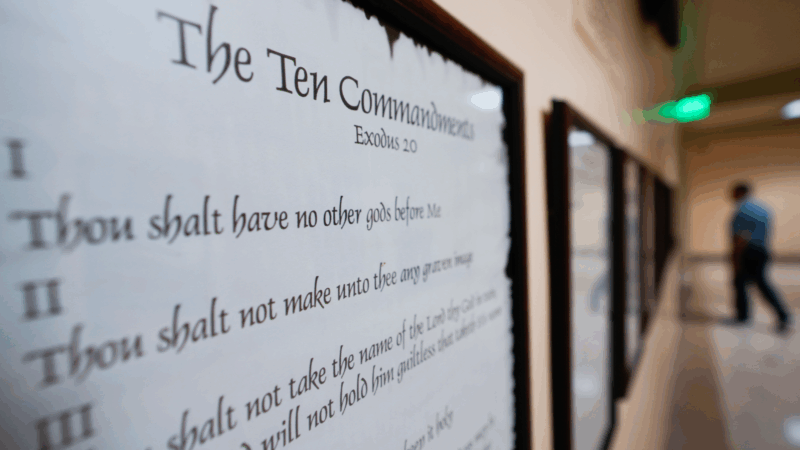Federal court says Alabama can carry out first nitrogen gas execution
Alabama's lethal injection chamber at Holman Correctional Facility in Atmore, Ala., is pictured in this Oct. 7, 2002 file photo.
MONTGOMERY, Ala. (AP) — Alabama will be allowed to put an inmate to death with nitrogen gas, a federal appeals court ruled Wednesday, refusing to block what would be the nation’s first execution by a new method since 1982.
A divided panel of the 11th U.S. Circuit Court of Appeals rejected Kenneth Eugene Smith’s request for an injunction to stop his execution by nitrogen hypoxia Thursday night. Smith’s lawyers, who have argued the state is trying to make him the test subject for an experimental execution method, are expected to appeal to the U.S. Supreme Court in a final bid to halt the scheduled execution.
The judges said in a 2-1 decision there is “no doubt that death by nitrogen hypoxia is both new and novel” but that Smith had failed to establish how it would violate the constitutional ban on cruel and unusual punishment. Circuit Judge Jill A. Pryor dissented from the decision, saying there are, “real doubts” about the protocol and what Smith will experience.
“He will die. The cost, I fear, will be Mr. Smith’s human dignity, and ours,” Pryor wrote in a dissent.
Robert Grass, an attorney for Smith, declined to comment Wednesday night.
Smith, 58, is one of two men convicted in the murder-for-hire slaying of a preacher’s wife in 1988 that rocked a small north Alabama community. Prosecutors said he and the other man were each paid $1,000 to kill Elizabeth Sennett on behalf of her husband, who was deeply in debt and wanted to collect on insurance.
Alabama Attorney General Steve Marshall praised the decision to let the execution proceed.
“Two courts have now rejected Smith’s claims,” Marshall said. “I remain confident that the Supreme Court will come down on the side of justice, and that Smith’s execution will be carried out tomorrow.”
The new execution method involves putting a respirator-type face mask over the nose and mouth to replace breathable air with nitrogen, causing death from lack of oxygen. The state predicted in court filings that the gas will cause an inmate to lose consciousness within seconds and cause death within minutes.
Critics of the untested method say the state can’t predict what will happen and what Smith will feel after the warden switches on the gas. His attorneys said he is at risk for a prolonged suffering and choking to death on his own vomit.
Some states are looking for new ways to execute death row inmates because the drugs used in lethal injections, the most common execution method in the United States, have become difficult to find. Three states — Alabama, Mississippi and Oklahoma — have authorized nitrogen hypoxia as an execution method, but no state has attempted to use it so far. If carried out, it will be the first time a new execution method has been used since lethal injection was introduced in 1982.
The appeals court ruling comes after oral arguments in which the Alabama attorney general’s office and Smith’s lawyer presented diverging accounts of the humaneness and risks execution by nitrogen hypoxia.
Smith’s attorneys said it is riddled with unknowns and potential problems in violation of a constitutional ban on cruel and unusual punishment.
“This is the first time this will ever be attempted. There is no data on exactly what’s going to happen and how this will go forward,” Grass told the court.
The American Veterinary Medical Association wrote in 2020 euthanasia guidelines that nitrogen hypoxia is not an acceptable euthanasia method for most mammals because the experience of oxygen deprivation “is distressing.” And experts appointed by the U.N. Human Rights Council cautioned that they believe the execution method could violate the prohibition on torture.
Alabama Solicitor General Edmund LaCour had urged the judges to let the execution proceed, saying, “Alabama has adopted the most painless and humane method of execution known to man.”
Dr. Philip Nitschke, a long-time advocate of the right-to-die movement — based on the concept that people, such as those with terminal illnesses, are entitled to opt to end their lives — testified before Huffaker for Smith’s legal team. He told The Associated Press that he is concerned about Alabama’s proposal. He said it’s possible the execution could proceeds quickly or become a “macabre” situation. Nitschke, who created a suicide pod using nitrogen gas, said one issue that could arise if is the seal not maintained on the mask.
If there are leaks — caused by a poor fit, Smith’s facial hair or his movements — then Smith could continue to draw in enough oxygen “to prolong into what could be a very rather macabre, slow process of slowly not getting enough oxygen,” Nitschke said.
Alabama previously tried to execute Smith by lethal injection in 2022 but called it off before the drugs were administered because authorities were unable to connect the two intravenous lines to his veins. Smith’s attorneys said he was strapped to the gurney for nearly four hours.
On Wednesday, the U.S. Supreme Court denied Smith’s request for a stay, rejecting his argument that it would be unconstitutional for the state to attempt a second execution after he survived the first.
Sennett, 45, was found dead March 18, 1988, in her home in Colbert County with eight stab wounds in the chest and one on each side of her neck, according to the coroner. Her husband, Charles Sennett Sr., killed himself when the investigation focused on him as a suspect, according to court documents.
Smith’s initial 1989 conviction was overturned on appeal, but he was retried and convicted again in 1996. The jury recommended a life sentence by a vote of 11-1, but a judge overrode that and sentenced him to death. Alabama no longer lets judges override jury decisions in death penalty cases.
John Forrest Parker, the other man convicted in the slaying, was executed in 2010.
Trump to raise global tariffs to 15%
President Trump previously said he would implement 10% global tariffs after the U.S. Supreme Court struck down his tariff policies.
Pin trading has taken over the Olympics. Here’s what it’s like in Milan
Pin trading has become a hallmark of the Olympics in recent decades — and not just for athletes. An official trading center in Milan was a hotspot for longtime collectors and curious newcomers alike.
US military airlifts small reactor as Trump pushes to quickly deploy nuclear power
The Pentagon and the Energy Department have airlifted a small nuclear reactor from California to Utah, demonstrating what they say is potential for the U.S. to quickly deploy nuclear power for military and civilian use.
How Nazgul the wolfdog made his run for Winter Olympic glory in Italy
Nazgul isn't talking, but his owners come clean about how he got loose, got famous, and how they feel now
Court clears way for Louisiana law requiring Ten Commandments in classrooms to take effect
The 5th U.S. Circuit Court of Appeals has cleared the way for a Louisiana law requiring displays of the Ten Commandments in public classrooms to take effect.
From cubicles to kitchens: How empty offices are becoming homes
Many U.S. cities have too many office buildings and not enough homes. Developers are now converting some old offices into apartments and condos, but it's going slowly.






